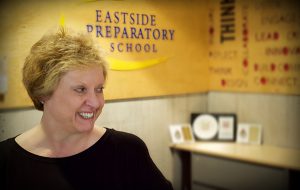Inspire Introduction
By Terry Macaluso, PhD, Head of School
MY FIRST TEACHING EXPERIENCE CAME AS A graduate teaching assistant, commonly referred to as a T.A. In that role, the objective was to walk fifty to eighty undergraduates who were not philosophy majors through a survey of 2000 years of western philosophy in twelve weeks. The campus was composed of several large, brick buildings, each of which—except science labs and art studios—looked the same on the inside even if there was structural variation in the design of the building envelope. We did what the spaces invited us to do. Fifty to eighty people sat in chairs in an amphitheater, and I talked. They wrote things down. I asked them, at the end of the course, to report back to me the things they had written down. There was no discussion of pedagogy—no thought given to how the educational experience might be received. The professor was an expert.
 Fortunately, things have changed—perhaps not so much in higher education as in secondary education. There is no script, no professorial doling out of precious information contained, primarily, in the mind of the professor. However, that is not surprising; “professing” was, after all, what was expected. The sixteen-year life of Eastside Prep has demonstrated, in multiple ways, the evolution of instruction accompanied by the universal access to information enjoyed by many citizens of the planet. Moreover, all of those evolutionary moments have been intentional.
Fortunately, things have changed—perhaps not so much in higher education as in secondary education. There is no script, no professorial doling out of precious information contained, primarily, in the mind of the professor. However, that is not surprising; “professing” was, after all, what was expected. The sixteen-year life of Eastside Prep has demonstrated, in multiple ways, the evolution of instruction accompanied by the universal access to information enjoyed by many citizens of the planet. Moreover, all of those evolutionary moments have been intentional.
This issue of Inspire is dedicated to the concept of intent. These articles describe the exploration of the EPS landscape; the aim is to consider the “why” of things. Why—this curriculum? Why—these buildings? Why—these activities? Why—this pedagogical approach?
During the twelve months between September 2017 and October 2018, EPS completed its second accreditation process. Academic Dean Matt Delaney speaks to the intention of that process in “This is Not Common in Schools.” EPS alumnus, William Poole (’09), shares his experience at Caltech, working toward a PhD, and continuing to pursue interests, many of which he discovered at EPS—because we let that happen intentionally. Dr. Elena Olsen, Upper School English, reviews Dr. John Medina’s presentation to EPS faculty based on his most recent book, Attack of the Teenage Brain, evidence of our continued interest in understanding the nature of the learner. Paul Hagen, Dean of Students, provides insight into the intentions that guide the design of experiences that take place beyond the campus. Finally, in her article “A Look Inside TALI,” Verity Sayles, Upper School English, offers some behind-the-curtain views about the very intentional design of TALI Hall.
These articles, and so many more, invite our readers to step into the EPS ethos. While it would be hubris to suggest that everything we do or design at EPS is entirely intentional, it is reasonable to say that the investment of time and resources by so many creates an extraordinarily intentional experience for EPS students, faculty, and parents. Our mission is our guide. It clearly and distinctly expresses precisely what we intend.

